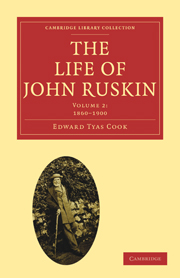Book contents
- Frontmatter
- Contents
- CHAPTER I UNTO THIS LAST (1860)
- CHAPTER II EXILE (1861–1863)
- CHAPTER III BOULOGNE—LUCERNE—MILAN (1861–1862)
- CHAPTER IV MORNEX—MUNERA PULVERIS (1862–1863)
- CHAPTER V HOME LIFE AT DENMARK HILL (1864–1866)
- CHAPTER VI SESAME AND LILIES—THE GROWN OF WILD OLIVE—THE ETHICS OF THE DUST (1865, 1866)
- CHAPTER VII TIME AND TIDE (1866, 1867)
- CHAPTER VIII RUSKIN's POLITICAL ECONOMY
- CHAPTER IX ABBEVILLE AND VERONA (1868, 1869)
- CHAPTER X OXFORD PROFESSOR (1870–1878)
- CHAPTER XI FIRST OXFORD LECTURES (1870, 1871)
- CHAPTER XII A DARK YEAE (1871)
- CHAPTER XIII BOTTICELLI (1872, 1873)
- CHAPTER XIV WITH ST. FRANCIS AT ASSISI (1874)
- CHAPTER XV THE END OF A ROMANCE (1875)
- CHAPTER XVI HOME LIFE AT BRANTWOOD (1872–1876)
- CHAPTER XVII VENICE REVISITED (1876–1877)
- CHAPTER XVIII FORS CLAVIGERA (1871–1878)
- CHAPTER XIX THE ST. GEORGE'S GUILD
- CHAPTER XX THE RUSKIN MUSEUM
- CHAPTER XXI SCHOOLS OF ST. GEORGE
- CHAPTER XXII ARROWS OF THE CHACE
- CHAPTER XXIII “THE DREAM” (1877–1878)
- CHAPTER XXIV STUDIES OF FLOWERS AND ROCKS (1878)
- CHAPTER XXV RETURN TO WORK (1878–1880)
- CHAPTER XXVI THE BIBLE OF AMIENS. FURTHER ILLNESSES (1880–1882)
- CHAPTER XXVII SECOND PROFESSORSHIP AT OXFORD (1882–1885)
- CHAPTER XXVIII PRÆTERITA (1885–1889)
- CHAPTER XXIX OLD AGE AND LAST WORKS (1886–1889)
- CHAPTER XXX CLOSING YEARS (1889–1900)
- CHAPTER XXXI CHARACTERISTICS
- CHAPTER XXXII INFLUENCE
- INDEX
CHAPTER X - OXFORD PROFESSOR (1870–1878)
Published online by Cambridge University Press: 07 September 2011
- Frontmatter
- Contents
- CHAPTER I UNTO THIS LAST (1860)
- CHAPTER II EXILE (1861–1863)
- CHAPTER III BOULOGNE—LUCERNE—MILAN (1861–1862)
- CHAPTER IV MORNEX—MUNERA PULVERIS (1862–1863)
- CHAPTER V HOME LIFE AT DENMARK HILL (1864–1866)
- CHAPTER VI SESAME AND LILIES—THE GROWN OF WILD OLIVE—THE ETHICS OF THE DUST (1865, 1866)
- CHAPTER VII TIME AND TIDE (1866, 1867)
- CHAPTER VIII RUSKIN's POLITICAL ECONOMY
- CHAPTER IX ABBEVILLE AND VERONA (1868, 1869)
- CHAPTER X OXFORD PROFESSOR (1870–1878)
- CHAPTER XI FIRST OXFORD LECTURES (1870, 1871)
- CHAPTER XII A DARK YEAE (1871)
- CHAPTER XIII BOTTICELLI (1872, 1873)
- CHAPTER XIV WITH ST. FRANCIS AT ASSISI (1874)
- CHAPTER XV THE END OF A ROMANCE (1875)
- CHAPTER XVI HOME LIFE AT BRANTWOOD (1872–1876)
- CHAPTER XVII VENICE REVISITED (1876–1877)
- CHAPTER XVIII FORS CLAVIGERA (1871–1878)
- CHAPTER XIX THE ST. GEORGE'S GUILD
- CHAPTER XX THE RUSKIN MUSEUM
- CHAPTER XXI SCHOOLS OF ST. GEORGE
- CHAPTER XXII ARROWS OF THE CHACE
- CHAPTER XXIII “THE DREAM” (1877–1878)
- CHAPTER XXIV STUDIES OF FLOWERS AND ROCKS (1878)
- CHAPTER XXV RETURN TO WORK (1878–1880)
- CHAPTER XXVI THE BIBLE OF AMIENS. FURTHER ILLNESSES (1880–1882)
- CHAPTER XXVII SECOND PROFESSORSHIP AT OXFORD (1882–1885)
- CHAPTER XXVIII PRÆTERITA (1885–1889)
- CHAPTER XXIX OLD AGE AND LAST WORKS (1886–1889)
- CHAPTER XXX CLOSING YEARS (1889–1900)
- CHAPTER XXXI CHARACTERISTICS
- CHAPTER XXXII INFLUENCE
- INDEX
Summary
“Multo magis, ut vulgo dicifcur, viva vox adficit. Nam licet acriora sint quse legas, altius tamen in animo sedent quæ pronuntiatio, vultua, habitus, gestus etiam dicentis adfigit.”
—Pliny(Letters, ii. 3).Ruskin's first Professorship (1870–78) was perhaps the busiest period even in his busy life. In addition to his work at Oxford, he published at various intervals portions of works on Botany, on Geology, and on Drawing. He started a library of standard literature. He founded a Museum at Sheffield. He engaged in several social experiments; the better sweeping of the streets in St. Giles's and the sale of tea at a fair price were not too trivial for his efforts, nor was the reformation of England, through a Companionship of St. George, too large. He wrote incessantly to the newspapers on topics of the day; and all the while he poured forth, at monthly intervals, that strange and passionate medley of information, controversy, homily, reminiscence, and prophecy which he entitled Fors Clavigera. These tasks were undertaken, not one thing at a time, but often all at the same time. “Head too full, ” he wrote in his diary (February 12, 1872), “ and don't know which to write first.” He solved the problem by writing something of everything every month, or even every day. He describes inFors how at a particular moment he had seven large books going through the press at the same time. “ There is no use, ” he wrote in his diary (January 29, 1872), “ saying tired and ill; always now.” No use; and no wonder.
- Type
- Chapter
- Information
- The Life of John Ruskin , pp. 169 - 201Publisher: Cambridge University PressPrint publication year: 2010First published in: 1911



